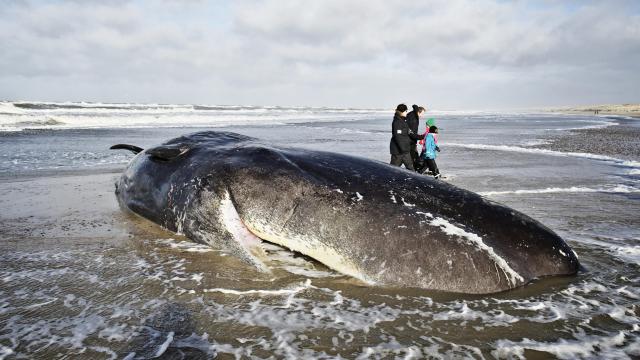Last year brought what seemed like a disturbing omen to communities surrounding Europe’s North Sea: A whole lot of beached sperm whales. As Gizmodo reported at the time, the whales entered the sea’s shallow waters, where their internal sonar-like systems stopped working, causing them to become stranded and die. But scientists didn’t know why the whales entered these dangerous shallow waters in the first place.
A beached whale in Denmark from 2014 (Image: AP)
A new team has come up with a cosmic hypothesis for the mysterious beachings: Perhaps the whales got stranded after trying to navigate using the Earth’s geomagnetic field during a solar storm. The Sun could have broken the whales’ GPS.
The idea is that if you have a map and a navigation system in your car, they might glitch and send you driving the wrong way, study author Klaus Henrich Vanselow from the University of Kiel in Germany told Gizmodo. “I think it’s the same for whales. They do not realise that the Sun is changing the geomagnetic environment for a short time.”
Mass sperm whale strandings have been recorded since the Middle Ages, but Vanselow was specifically interested in one that occurred at the end of 2016, when 29 male sperm whales washed ashore in Germany, Britain, France and The Netherlands. Autopsies revealed that the whales were all healthy aside from some debris in nine of their bellies, which was not enough to kill them.
Vanselow realised that many animals, including cetaceans, navigate via the Earth’s magnetic field (he has studied the effect of magnetic anomalies on whale behaviour in the past). The team collected data on the magnetic field’s strength and the angles it made with the Earth, and noticed that just before the strandings began, some measuring stations recorded magnetic field changes from solar storms, flares of particles blasting off of the Sun and streaming at Earth. He and his co-authors published their findings in the International Journal of Astrobiology last month.
The timing of a strong solar storm prior to the whale beachings led the researchers to a hypothesis. While female sperm whales remain closer to the equator to raise their calves, males swim north to feed. Perhaps, then, the males adapt to a quieter magnetic field in those more equatorial waters, making them susceptible to random and large magnetic field fluctuations from solar storms they face further north.
As the BBC notes, this paper merely offers a plausible explanation and a hypothesis about a single event that would be difficult to prove. There are plenty of other factors to take into account, such as increased whale populations due to decreased whaling pressure, earthquakes, boats and oil development. “It would be difficult to say that ‘yes this was the cause’, we would be cautious in saying that,” Abbo Van Neer from the University of Hannover, who performed some of the whale autopsies, told the BBC. “But it is a valid hypothesis and a potential reason for the stranding.”
So, next time you hear about an incredibly powerful aurora borealis, keep your eyes open. You might spot some lost whales.
